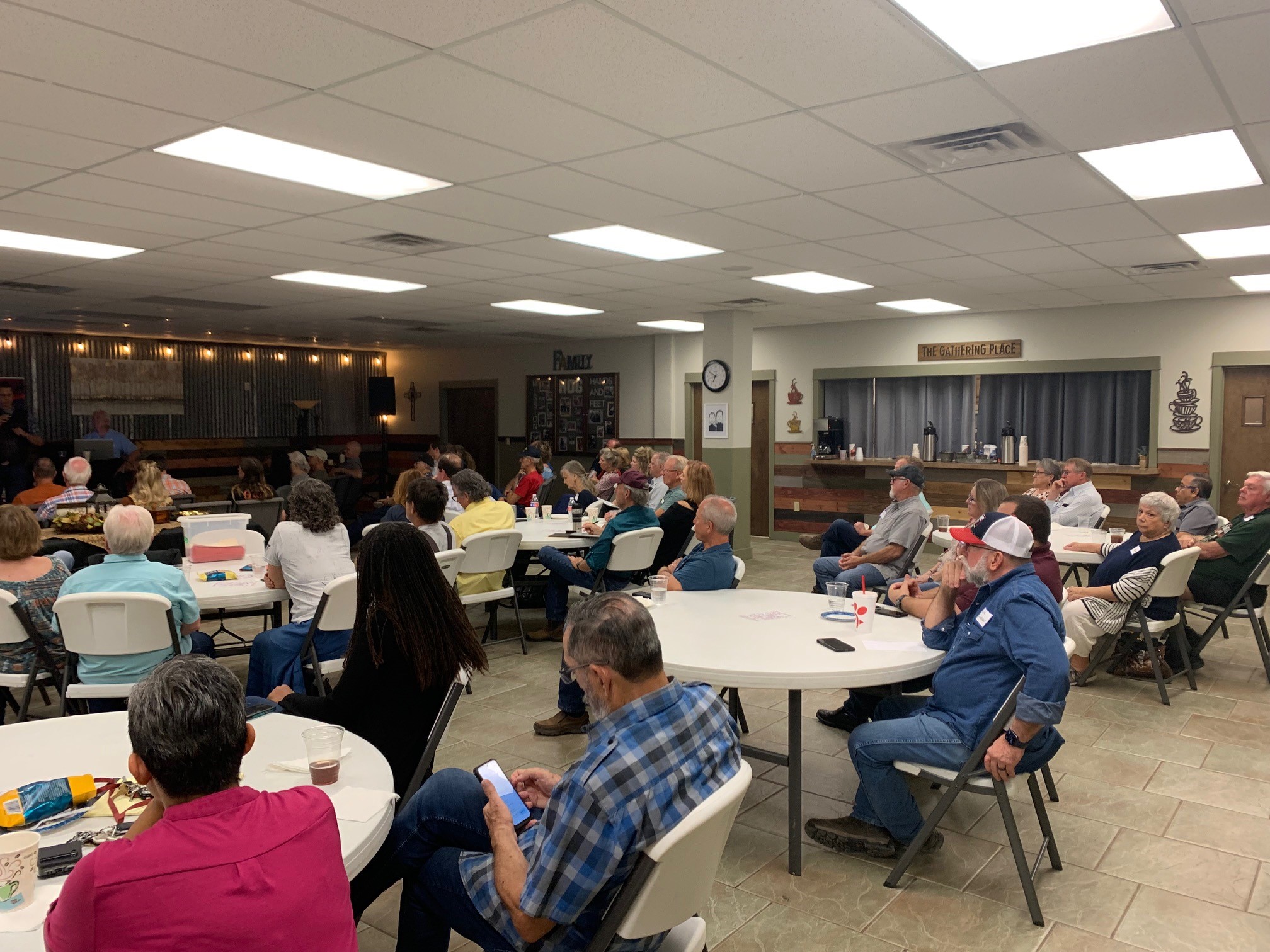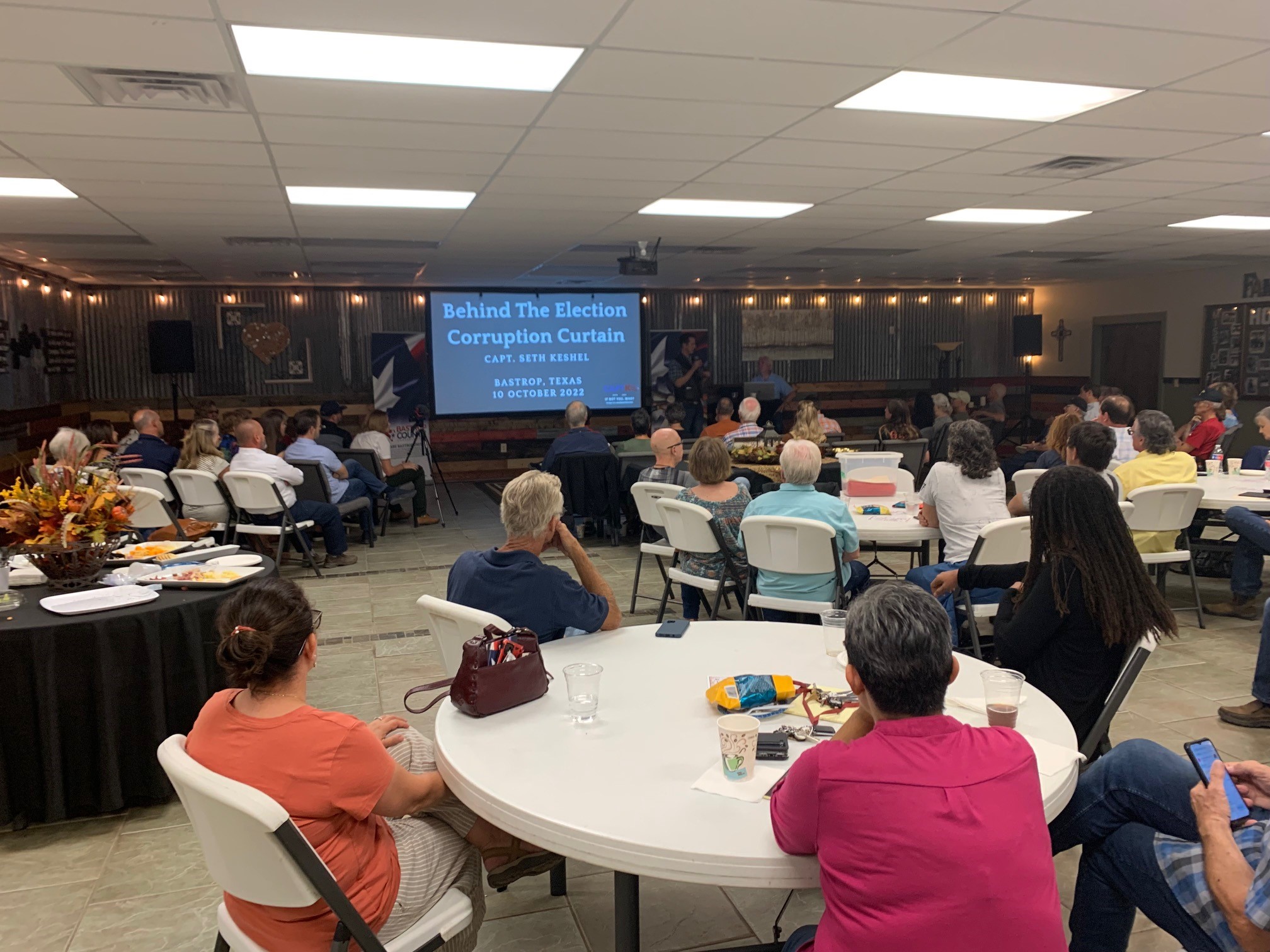Pictured left to right: Seth Keshel, Mel Cooper, Dave Clements, and Venkat Varada
- Seth Keshel and David Clements gave outstanding presentations. The meeting lasted three hours and the audience would have stayed longer. We had representatives from five counties.
- Key take away – elections tracked with computers are subject to fraud and, in many counties, the statistics overwhelming support the conclusion that fraud occurred.
- The speakers provided solutions for the near-term, mid-term, and long-term.


Seth Keshel and David Clements provided statistical information that left no doubt that elections are subject to fraud from many fronts and most all have been used over the years. Mail-in ballots are harvested and fraudulently voted, fictitious people vote where voter identification is not required, votes are changed by election computers, votes are omitted by election computers, and more. Dinesh D’Souza’s documentary 2000 Mules focused on rampant voter fraud through the mail-in voting process. If you haven’t seen it, you must. This presentation focused on statistical anomalies attributable to election computers.
Election Computers
As long as we use computers to capture and tabulate our votes, there is a chance for fraud.
No matter how many checks and balances, or how well managed an elections office might be, as long as we use computers to capture and tabulate our votes, there is a chance for fraud. The fraud the speakers referred to is from outsiders, people who access the computers for fraudulent purposes. While there may be no fraud today, as discussed below, computers can be breached and data accessed for the wrong purposes when we least expect it.
The Bastrop County tabulation computer, the one that compiles our votes, is not connected to the internet. It has been represented to the Elections Office by the machine provider that connectivity hardware is not installed on the machine. Wi-Fi connectivity has been tested which confirmed no connection was active at the time of testing.
Our speakers noted that these same representations were made to election offices in other States, and it was later discovered in public testimony that their computers did in fact have this internet connectivity hardware and it was used from time to time. This is where the problem lies. Most election computer users are not programmers or hardware experts and have to trust third parties. We have heard allegations about numerous election machine providers and how their access gives them the opportunity to alter votes with no audit trails. Any time an outside third party has access to an election computer, we are subject to being compromised. Controls do not apply to malicious computer experts determined to access the data.
Solutions
1. Short-term
Short-term it is best to vote on election day, preferably in the afternoon.
Although a statistical presentation by our speakers made it easy to conclude that material voter fraud occurred in certain counties, the speakers offered solutions. Short-term it is best to vote on election day, preferably in the afternoon. Why? The computer algorithms need to “know” the vote count in order to activate vote manipulation. The sooner the algorithm can identify a voting trend the sooner it can start manipulating the trend, thereby spreading the fraudulent votes over more days making an issue harder to identify. Vote on election day.
The computer manipulates the votes by tracking your votes primarily during early voting ballots, but also votes submitted early on election day. Then, systematically, the computer algorithm alters the election outcome by omitting or changing votes. Many times, this manipulation can be seen in the recorded voting trends the afternoon of election day when one candidate or the other suddenly begins to receive a noticeably larger and unusual percentage of the votes. This should trigger a hand ballot count.
One of the real-time statistical analyses presented allowed the attendees to watch a certain election while the total votes actually increased and decreased, and votes for one candidate decreased while another increased. In a properly run process, this would have been impossible. If this happens, you have a problem, period. This was a glaring example of voter fraud through computer generated vote manipulation.
Another short-term action you can take is to volunteer to serve as an election judge or poll watcher to assist in the accuracy of our electoral process. These functions are crucial to the process. Your local Republican party or Election Administration office can assist you in making arrangements to serve in these positions.
2. Long-term
You can contribute to a longer-term solution by letting your election administrator and county commissioners know that you want the computers removed.
Longer term, counties need to:
- Limit mail-in ballots (except for military and similar voters)
- Eliminate computers
- Return to counting paper ballots
- Require voter identification.
Bastrop County requires voter identification. This is crucial to election integrity. A common objection to paper ballots is the financial cost. Yes, it will be more costly without computers, but what is the integrity of our elections worth?
You can contribute to a longer-term solution by letting your election administrator and county commissioners know that you want the computers removed. Hand counts are the solution, not a perfect solution but the best available today. Their primary benefit is they are not subject to manipulation by third parties. Many counties have already taken the step and moved to hand counted paper ballots. To people who say Bastrop County cannot do this, see the recount information below. It has already been done and was performed efficiently and effectively.
Real Examples
1. Williamson County
We appear to have issues in Texas, even close to home in places like Williamson County.
Two of the attendees at our meeting stated that they walked the streets and roads in Williamson County and spoke with hundreds (probably over 1,000) of residents. They discovered a certain percentage of the residents who stated they voted in 2020 but the County voting records did not reflect their votes. And a percentage of the residents’ votes were not cast for the person they intended.
Interestingly, the percentages of issues discovered in this test matched the percentages Keshel and Clements found in other counties, in and outside of Texas. Clements stated that this was a commonly designed machine algorithm, either pre-built into the machines themselves or used by malicious people who accessed the machines later. Coincidence? The Chairman of the Republican Party of Williamson County vehemently denies that there are any issues in the County.
2. Bastrop County
On the other hand, you have Bastrop County. It certainly appears to have had accurate elections based on recent hand re-counts:
- November 2020 – Donna Snowden/Cheryl Reese – Commissioner Precinct 4 (approximately 25% of the County re-counted) – paper ballot recount and machine count match exactly
- May 2021 – Jimmy Crouch/Cheryl Lee – Bastrop City Council – count was for the city of Bastrop – paper ballot recount and machine count match exactly
- March 2022 – Tom Glass/ Stan Gerdes/Paul Pape – Texas House District 17 – recount was for the entire County – paper ballot recount and machine count reflect one under-vote
Bastrop County can feel comfortable with past election results based on the foregoing. Several compliments by politicians and workers were given to the organization and responsiveness of the Bastrop County Elections Administration office run by Kristin Miles, Elections Administrator.
The morning after our meeting, Keshel and Clements addressed Bastrop Commissioners’ Court and shared their concerns and solutions.
Summary
Based on the data presented, there is election fraud taking place in the country. Due to the increased fraud in the 2020 election, people are now more aware than ever and are getting involved, such as serving as elections judges or poll watchers during the voting process, and some counties have moved to paper ballots. Although not all counties are experiencing election integrity issues, many are. It is up to us to stop the trend.
Reference
The following information was referenced at the meeting:
Speakers

Seth Keshel
Seth Keshel, MBA, is a former Army Captain of Military Intelligence and Afghanistan veteran. His analytical method is known worldwide and has been recognized by President Donald Trump. Seth is at the forefront of the national election integrity movement and lives in Weatherford, Texas. Seth is active in conservative grassroots efforts in Texas.
captk.com | @RealSKeshel on Truth Social

Dave Clements
David Clements has spoken in at least 25 states and at more than 60 different events since Jan. 6, 2021 on voter integrity and was a voter integrity activist in the New Mexico elections. Clements is an attorney, former award winning business law professor and prosecutor. During his legal career, Professor Clements was a leader in trial teams that secured eight first degree murder convictions, including members of the “AZ Boys” drug trafficking organization. Professor Clements now applies his vast evidentiary and courtroom experience to the realm of elections. His advocacy has led to audits and canvassing operations being implemented across the country, with some efforts resulting in elimination of election machines that facilitate fraud.
